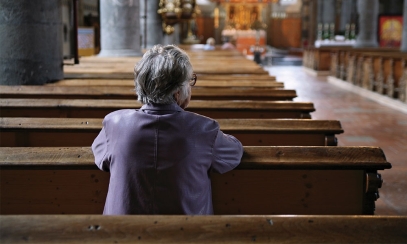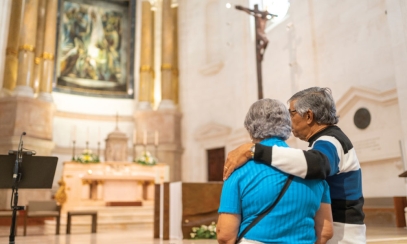How can ‘curiosity’ be a bad thing?
I have heard that curiosity can be considered a vice. That doesn’t make any sense to me. The advances of science, technology, and social reforms wouldn’t have happened if people had suppressed their natural desire to venture into the unknown and ask questions that challenged the status quo. It seems more like an intimidation tactic on the part of institutions.
This is a fantastic question. I am grateful that you mentioned how odd (and even seemingly evil) it is to call curiosity a potential vice. I had read an article that described curiosity as the “virtue” that “oppressive states fear.” Freethinkers and those who truly make progress in this world are the ones who are constantly feeding their insatiable curiosity, aren’t they?
Some people have such a negative view of Christians and of the Catholic Church that they would maintain that defining curiosity negatively is merely another way the Church wants to control how and what people think. But that would be to completely ignore the very foundations of Christianity. As Catholics, we believe that God is Truth Himself. Jesus said, “I … am the Truth ….” In John’s Gospel, God is revealed as the “Word (logos or “reason”) made flesh.” This reality has not only guided the Church’s approach to faith but also paved the way for scientific inquiry and study in the first place.
With the worldview of Catholic Christianity, philosophy and the arts flourished. Inquiry into meaning and the way things work was given a solid setting for the pursuit of truth. In fact, despite what some people might say, the Church not only developed modern science but actively led the way and continues to make contributions in virtually every scientific domain. The Church is not opposed to asking questions, or the fact that we, as human beings “want to know.”
But if that is the case, then why be down on curiosity?
In order to understand the classic assessment of curiosity as a vice (and not a virtue), we have to understand the term and what it means. For most of us, curiosity is simply “wanting to know.” It is the desire to know the story or to know the details; it is the desire to know the truth. Now, St. Thomas Aquinas (a great mind who pursued truth his entire life) wrote that knowledge in and of itself is a good. Where we can get into trouble is with regard to the method and motivation that undergirds the pursuit of that knowledge.
In that sense, curiosity is at least as “morally neutral” as the internet. We know that the internet can be a powerful tool for good and that it can be a powerful tool for harm. In and of itself, it is neither good nor bad. How one uses the internet is often the determining factor when it comes to the moral question. In particular, when it comes to the internet, it can direct a person toward knowledge, freedom, and ultimately wisdom, or it can rob a person of sense, enslave them, and make them foolish.
There could be any number of ways to misuse curiosity. St. Thomas Aquinas names a few. There is the desire for knowledge that isn’t my business (gossip). In these cases, we all know how curiosity can poison our conversations and relationships. A couple of teachers gather together and begin talking about a student in order to help him or her, but then the conversation steers away from what is genuinely helpful and begins to focus on details that help no one. And yet, the desire to know these details drives the conversations so frequently that the content of relationships in the teachers’ lounge centers around the next piece of information.
There is the desire for knowledge that arises out of a sense of pride and wanting to “one up” those around me. This could be connected to the desire for knowledge that is beyond me but is motivated by the desire to appear more intelligent than I am. We have all known people like this, and we have often been people like this. We don’t necessarily know a subject through and through, but that doesn’t mean that we don’t have an opinion about it! Aquinas mentioned those monks (his particular context) who would venture into parts of the monastic library where complicated and sophisticated tomes were kept so fellow monks would take note of what they were reading. These monks didn’t necessarily desire to know a topic through and through, but wanted to gather enough information to appear to be wise.
We could also desire to know (and be so driven by this desire) that it becomes the end. St. Thomas noted that people who hand themselves over to unchecked curiosity could lose sight of the ultimate goal of any pursuit of truth: God Himself. All truth has God as its source and God as its proper end. But some make the acquisition of knowledge to be the goal. Aquinas notes that, in doing this, they are missing the entire point of study.
And this is where it helps to define our terms. Curiosity, as St. Thomas understood it, was the vice that opposed the virtue of “studiousness.” While curiosity might be loosely defined as I’ve used it (“the desire to know”), studiousness is defined as “knowledge pursued well.”
Take a look at your own life. How often has the “desire to know” gotten in the way of what you were supposed to be doing? How often have we all put the more important task of the moment aside in order to satisfy our curiosity? This is why terms like “click-bait” and “YouTube rabbit trail” exist. We have a natural inclination to “want to know,” but we also have a difficult time governing that impulse.
This is one of the reasons why spiritual writers would talk about the ways in which Christians need to be “temperate” in their pursuit of knowledge. Think of this in terms of food. Food is a good. But I could use this good in a bad way, so I must be temperate in my approach to food. From ordering a certain kind of food because I believe that it will make others think well of me (vanity), to eating far more than my body needs (gluttony), to being unable to enjoy what I am currently eating because I want to go back up to the buffet and try “the next thing” (dissatisfaction).
I mentioned before that some influential people have been described as having an “insatiable curiosity.” This might be so. But they placed that desire for knowledge (a certain kind of curiosity) at the service of studiousness. They pursued knowledge well.
We all have the desire to know. It would serve us well if we were better able to identify the fact that there are things that we don’t need to know and things that we do not have a right to know, regardless of how enticing they may be. We have the desire to be informed, but it would be good for us to be able to put our primary duties ahead of the curiosities that vie for our attention and time. We want to become wise, but wisdom includes knowing what is worth knowing and knowing what can remain unknown.
Father Michael Schmitz is director of youth and young adult ministry for the Diocese of Duluth and chaplain of the Newman Center at the University of Minnesota Duluth. Reach him at fathermikeschmitz@gmail.com.



